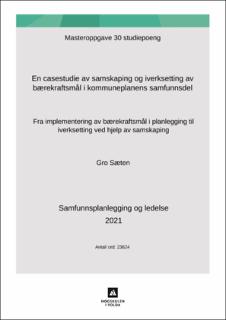En casestudie av samskaping og iverksetting av bærekraftsmål i kommuneplanens samfunnsdel. Fra implementering av bærekraftsmål i planlegging til iverksetting ved hjelp av samskaping
Master thesis
Permanent lenke
https://hdl.handle.net/11250/2759792Utgivelsesdato
2021Metadata
Vis full innførselSamlinger
- Samfunnsplanlegging [67]
Sammendrag
Sammendrag
Regjeringen har i «Nasjonale forventninger til regional og kommunal planlegging 2019-2023» bestemt at FNs bærekraftsmål skal legges til grunn for regional og kommunalplanlegging, og vektlegger at samarbeid på tvers av samfunnssektorer kan bidra til læring og stimulere til felles innsats for å nå bærekraftsmålene (Kommunal- ogmoderniseringsdepartementet, 2019). Det finnes ingen fasit på hvordan målene skalimplementeres (Nordlandsforskning, 2020) eller hvordan iverksetting av kommuneplaner skalforholde seg til bærekraftsmålene. Med bærekraftsmål nr. 17 «Samarbeid for å nå målene» plassert øverst som en forutsetning for å nå de andre bærekraftsmålene, ligger det en forventning om bruk av samskaping som verktøy i planlegging.
Denne masteroppgaven har som formål å forstå hvordan kommuner som har implementert bærekraftsmålene i kommuneplanens samfunnsdel bruker samskaping som verktøy når kommuneplanen iverksettes.
Oppgaven bygger på en kombinasjon av dokumentanalyse og intervju i tre case-kommuner, som i 2020 hadde implementert bærekraftsmålene og vedtatt kommuneplanens samfunnsdel. De tre kommunene er Arendal, Asker og Lunner.
Funnene i studien tyder på at kommunene sikrer iverksetting av kommuneplanens bærekraftsmål gjennom kobling til økonomiplanen og gjennom «den røde tråden» i plansystemet. Videre tyder studien på at kommunene er godt kjent med samskapingsbegrepet, men at forståelsen som legges til grunn for iverksetting av kommuneplanens bærekraftsmål er ulik. Dette gir ulikheter i hvordan kommunene praktiserer samskaping når bærekraftsmålene i kommuneplanen iverksettes. Abstract
In «National expectations for regional and municipal planning 2019-2023», the Norwegian Government has decided that the UN's sustainability goals shall be used as overall goals for regional and municipal planning. The national expectations emphasizes that cross-sectorial cooperation can contribute to learning and stimulate joint efforts to achieve the sustainability goals (Kommunal- og moderniseringsdepartementet, 2019). There is no recipe on how the goals will be implemented in planning (Nordlandsforskning, 2020), or how the implementation of municipal master plans will relate to the sustainability goals. However, with goal no. 17 "Partnership for the goals" placed above, as a prerequisite for achieving the other sustainability goals, there is an expectation of using co-creation as tool in planning.
This study aims to understand how co-creation is used as a tool when sustainability goals in the municipality master plans are implemented. The study is based on a combination of document analysis and interviews in three case-municipalities, that during 2020 had implemented the sustainability goals and adopted the municipality master plan. The three municipalities are Arendal, Asker and Lunner.
The findings of the study indicate that the case-municipalities ensure the implementation oft he municipal plan's sustainability goals through the financial plan, and through “the red thread" in the planning system. Furthermore, the study indicates that the case-municipalities are well acquainted with the concept of co-creation, but the understanding that forms the basisfor the implementation of the municipality master plan is different. This results in differences in how municipalities practice co-creation when the sustainability goals in the municipal plan are implemented.
